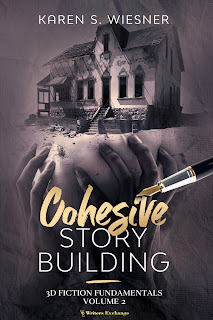Writer's Craft Article
Fiction Fundamentals: Writing
Elbow Grease, Part 5D
General Revision Choices, continued
by Karen S. Wiesner
Based on Cohesive Story Building, Volume 2: 3D Fiction Fundamentals Collection

In this three month, in-depth series, we're going to go over what could be considered the grunge work in building a cohesive story. Revising, editing, and polishing require a little or a lot of writing elbow grease to finish the job and bring forth a strong and beautiful book.
In the previous part of this series, we went over general revision choices. Let's continue.
Tip Sheet: Effective Revision Choices
• As a general rule, avoid long sentences. While it's true that a dramatic scene should have longer sentences than an action scene, be careful not to have too many. Overuse of long sentences makes the style of writing clunkier than it needs to (and should) be. Take this example, for instance:
It was
too terrible to close his eyes, and they burned with an internal pressure while
his mouth was locked open in a scream that never came--at least he still
recognized the shapes around him as hallucinations.
Now the panting confusion of this sentence might seem extreme, but I see sentences like this all the time as a contest judge and critic. Sentences can't be readily comprehended, let alone absorbed, in this form. Most readers can digest a single action or idea, perhaps two, in a single sentence. Any more than that, and they start to get confused and can't follow the action.
Think about each portion of a sentence as one action/idea that needs to be comprehended by the reader. For instance, one action/idea could be that the hero can't close his eyes. Next, he's realizing that he can at least still recognize the shapes as hallucinations. Then his mouth is locking open in a scream. You get the picture. Now let's look at this example as it was published in its more digestible, pleasing format in Thunderhead, by Douglas Preston and Lincoln Child:
It was too terrible. He could not close his eyes, and they burned with an internal pressure. His mouth was locked open in a scream that never came. At least he still recognized the shapes around him as hallucinations.
Imagine if every single sentence in your book was made up of three or four actions/ideas. It would read like you were plodding one mucky step after the other through a swamp.
Breaking up long sentences into two or more, as seen in the examples below, makes them much more immediate, and allows the reader to absorb what she's reading more easily.
Collet wheeled, his anger brimming as he thought, They lured us upstairs with the intercom! Searching the other side of the bar, he found a long line of horse stalls but no horses. Apparently the owner preferred a different kind of horsepower; the stalls had been converted into an impressive automotive parking facility, and the collection was astounding, including a black Ferrari, a pristine Rolls-Royce, an antique Astin Martin sports coupe, a vintage Porsche 356.
***
Collet
wheeled, anger brimming. They lured us
upstairs with the intercom! Searching the other side of the bar, he found a
long line of horse stalls. No horses. Apparently the owner preferred a different
kind of horsepower; the stalls had been converted into an impressive automotive
parking facility. The collection was astounding--a black Ferrari, a pristine
Rolls-Royce, an antique Astin Martin sports coupe, a vintage Porsche 356.
--The Da Vinci Code, by Dan Brown
In the revised version, we get rid of as, realized, and that, and the result has a smoother rhythm and more impact. You'll also notice that the revised version just reads smoother, more like the music flow we're striving for as composing writers. Break your sentences up so readers can readily digest them.
The editing and polishing stage is the perfect time to be on the lookout for those overly long sentences. If you have to take a highlighter to each one so you're focused on fixing this problem, know that the end result will be well worth your effort.
• Unassuming it. I'm guilty of assuming that everyone will understand what I mean when I use the word it. Most writers do have some guilt in this regard. This happens most often in a first draft, but during editing and polishing, pay special attention to this little word to make sure you're not assuming your reader will know what you mean with its use. The word it, especially when used near the beginning of a sentence, loses focus and therefore impact on the reader. Don't let it sit there, assuming a role that hasn't been defined, explained, or adequately described. Try to make it more specific in your sentences, for instance:
It had taken a heavy toll on him, but he didn't appreciate seeing proof in the mirror.
This sentence begs a myriad of questions. What took a heavy toll? A death, an accusation, a sledge hammer? Any one of these and a million more could work. Luckily, this author didn't allow an it to assume itself to the reader.
The
past year had taken a heavy toll on him, but he didn't appreciate seeing proof
in the mirror.
--The Da Vinci Code, by Dan Brown
Next week, we'll conclude the general revision choices.
Happy writing!
Karen S. Wiesner is the
author of Cohesive Story Building, Volume
2 of the 3D Fiction Fundamentals Collection
http://www.writers-exchange.com/3d-fiction-fundamentals-series/
https://karenwiesner.weebly.com/writing-reference-titles.html
Karen
Wiesner is an award-winning,
multi-genre author of over 150 titles and 16 series.






































